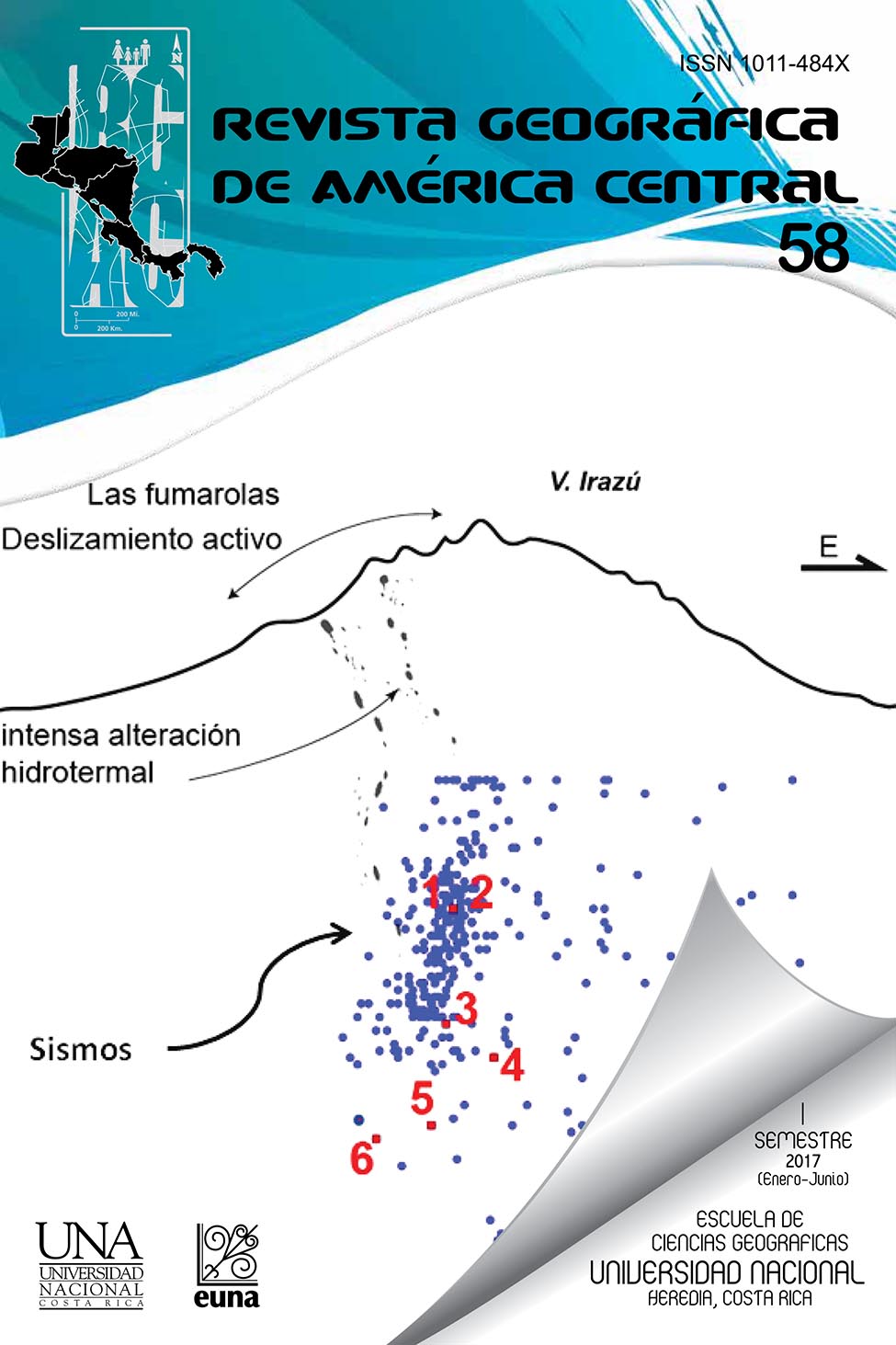INDEX OF VULNERABILITY OF WATER RESOURCES FOR IRRIGATION IN THE BASIN OF NARANJO RIVER, CUBA
DOI:
https://doi.org/10.15359/rgac.58-1.13Keywords:
Vulnerability, suitability for irrigation, water retention, water stress Naranjo River BasinAbstract
The vulnerability analysis of the Naranjo River Basin is a technical diagnostic study that provides basic and strategic information for the comprehensive management plan for water resources. For this study, six representative sections of the basin were considered. The vulnerability of the basin was determined through indicators of the hydrological regime and water quality based on FAO criteria for irrigation water. As a result, it was determined that the vulnerability index due to shortages has increased from moderate to high, and it has been attributed to the very low capacity for regulation and water retention and moderate use of the resource. The waters are not suitable for irrigation of agricultural crops, and they have slight to moderate restrictions. There is a danger of soil alkalization resulting from concentrations of bicarbonate in the water. The vulnerability could increase with the presence of some factors derived from climate change, due to the reduced supply and increased demand for water for agricultural activities in the area.
References
Ayers, R. S. Westcot, D.W. (1987). La calidad del agua en la agricultura. Roma: Estudio FAO. Revista Riego y Drenaje, 29(1) 35 págs.
IDEAM (2010). Propuesta de indicadores del régimen hidrológico Instituto de Hidrología, Meteorología y Estudios Ambientales. Ministerio de Medio Ambiente, Vivienda y Desarrollo territorial. Bogotá, Colombia. 2010.
Fuentes, J. L. (2003). Técnicas de riego. 4a edición revisada y ampliada ed. Madrid: Coedición Ministerio de Agricultura, Pesca y Alimentación - Ediciones Mundi-Prensa, 483 p.
IPCC. (2007). Cambio Climático 2007: Informe de Síntesis. Ginebra, Suiza: Informe del Grupo Intergubernamental de Expertos sobre el cambio climático.
IPCC. 2008.. El Cambio Climático y el agua. Ginebra, Suiza.
IPPC. (2007). Climate Change: impacts, adaptation and vulnerability. Contribution of Working Group II to the Fourth Assessment Report of the Intergovernmental Panel on Climate Change. Cambridge, UK: Cambridge University Press
Magrin, et. al. Peña, Fernández (2007). Latina America, Climate Change 2007: Impacts, Adaptation and Vulnerability, Contribution of Working Group II to the Fourth Assessment Report of the Intergovernmental Panel on Climate Change. Cambridge University Press.
Rosenzweig, et.al. Ramirez, Perdomo (2004). Water Resources for agriculture in a changing climate: International case studies. Global Environmental Change, 14(4) 135 págs.
Chaves, H., y Alipaz, S. (2007). An Integrated Indicator Based on Basin Hydrology, Environment, Life, and Policy: The Watershed Sustainability Index. Water Resources Management.; (2007). 21:883-895.
Sharma, H (2009). Application of climate information and predictions in water sector: capabilities. WCC-3. Geneve.
Troballes, J (2015).Troballes.org/wp-content/uploads/Agua-un-elemento-esencial-para-la-vida.pdf
CONAGUA. (2015), Vulnerabilidad de los recursos hídricos de México ante el cambio climático.
Carreño, M. (2013). Sistemas de indicadores para la evaluación de riesgos. Costa Rica- 115 p.
Downloads
Published
How to Cite
Issue
Section
License
Proposed policy for journals offering Open Access
Authors publishing their works in the Journal acknowledge and agree to the following terms:
a) Authors retain the copyrights to their works and guarantee the Journal the right to be the first to publish their works, under the Creative Commons License Attribution-NonCommercial-ShareAlike 4.0 International, CC BY-NC-SA 4.0 International (https://creativecommons.org/licenses/by-nc-sa/4.0/deed.es), which allows others to share works upon complying with the acknowledgment of authorship and mention of the Journal as the original publisher of the work.
b) Authors are permitted to separately establish additional agreements for the non-exclusive distribution of the official edition of the work published in the Journal (for example, authors may desire to place the work in an institutional repository or incorporate it into a book that is to published elsewhere) so long they acknowledgment to recognize the Journal as the original publisher. The aforementioned additional agreements must respect the terms of the non-profit character and sharing philosophy of the original license (CC BY-NC-SA 4.0 International, https://creativecommons.org/licenses/by-nc-sa/4.0/deed.es).
c) Authors are encouraged to archive the post-print or editor/PDF version in Open Access repositories.






 REVGEO is licensed under https://creativecommons.org/licenses/by-nc-sa/4.0/deed.es
REVGEO is licensed under https://creativecommons.org/licenses/by-nc-sa/4.0/deed.es
.svg_4.png)

_(1).png)
_(1)_(1)_(1)_1.png)
(2)(1)(1)(1).png)
